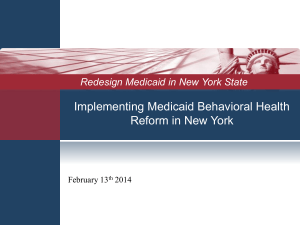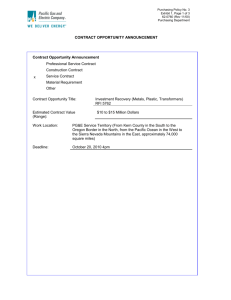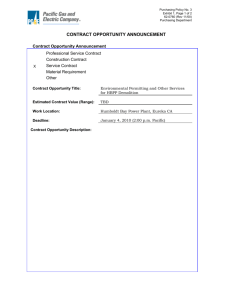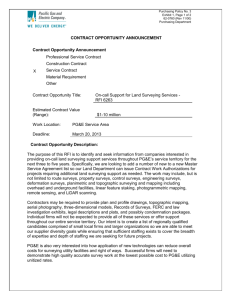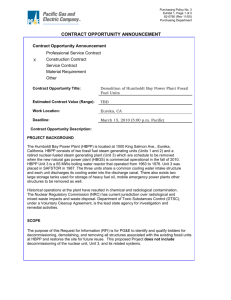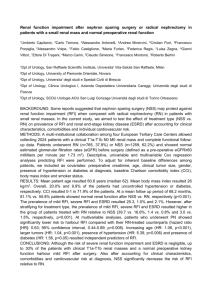RFI Questionnaire Packet
advertisement
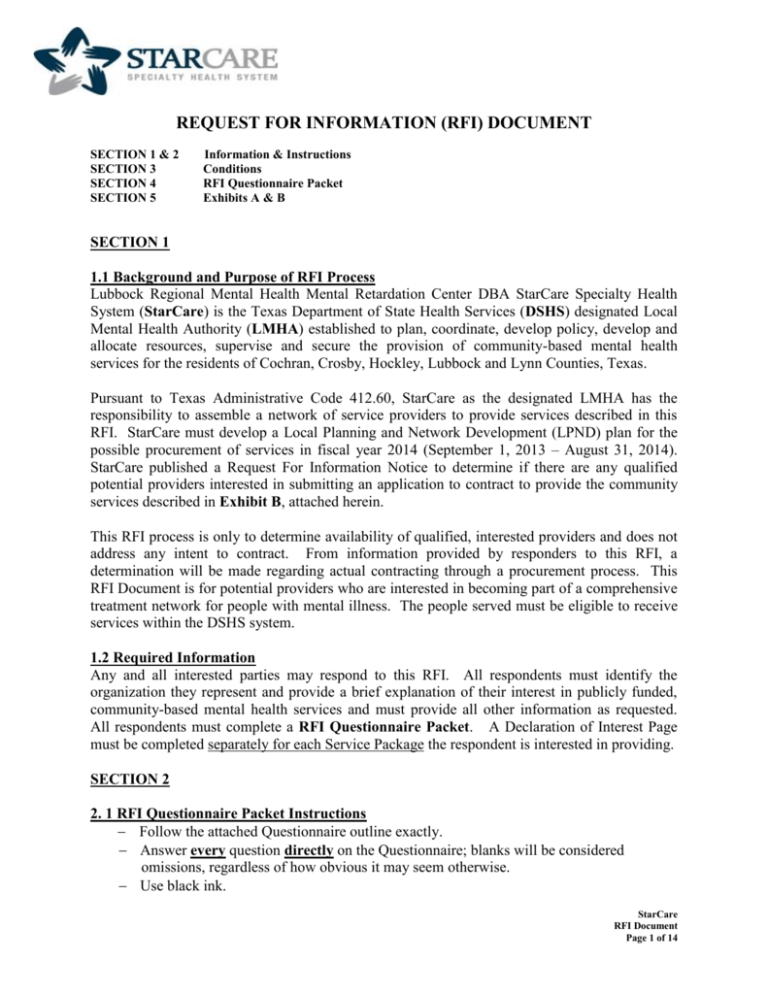
REQUEST FOR INFORMATION (RFI) DOCUMENT SECTION 1 & 2 SECTION 3 SECTION 4 SECTION 5 Information & Instructions Conditions RFI Questionnaire Packet Exhibits A & B SECTION 1 1.1 Background and Purpose of RFI Process Lubbock Regional Mental Health Mental Retardation Center DBA StarCare Specialty Health System (StarCare) is the Texas Department of State Health Services (DSHS) designated Local Mental Health Authority (LMHA) established to plan, coordinate, develop policy, develop and allocate resources, supervise and secure the provision of community-based mental health services for the residents of Cochran, Crosby, Hockley, Lubbock and Lynn Counties, Texas. Pursuant to Texas Administrative Code 412.60, StarCare as the designated LMHA has the responsibility to assemble a network of service providers to provide services described in this RFI. StarCare must develop a Local Planning and Network Development (LPND) plan for the possible procurement of services in fiscal year 2014 (September 1, 2013 – August 31, 2014). StarCare published a Request For Information Notice to determine if there are any qualified potential providers interested in submitting an application to contract to provide the community services described in Exhibit B, attached herein. This RFI process is only to determine availability of qualified, interested providers and does not address any intent to contract. From information provided by responders to this RFI, a determination will be made regarding actual contracting through a procurement process. This RFI Document is for potential providers who are interested in becoming part of a comprehensive treatment network for people with mental illness. The people served must be eligible to receive services within the DSHS system. 1.2 Required Information Any and all interested parties may respond to this RFI. All respondents must identify the organization they represent and provide a brief explanation of their interest in publicly funded, community-based mental health services and must provide all other information as requested. All respondents must complete a RFI Questionnaire Packet. A Declaration of Interest Page must be completed separately for each Service Package the respondent is interested in providing. SECTION 2 2. 1 RFI Questionnaire Packet Instructions Follow the attached Questionnaire outline exactly. Answer every question directly on the Questionnaire; blanks will be considered omissions, regardless of how obvious it may seem otherwise. Use black ink. StarCare RFI Document Page 1 of 14 Submit one (1) original, unbound Questionnaire Packet and five (5) stapled copies of the Questionnaire Packet. Page one (1) of your submission packet must be page one “Business Demographics” of the Questionnaire Packet. Submit a separate Declaration of Interest Page for each Service Package you are interested in providing. Questionnaire Packets must be received no later than 4:00 p.m. Central Standard Time on Monday, July 30, 2012. Packets received after the due date and time will not be considered for review as part of the RFI process. Submit sealed RFI Questionnaire Packets with a cover letter to: StarCare Attention: Marcella Ford, Contracts Management Director P.O. Box 2828 Lubbock, Texas 79408-2828 Questionnaire Packets must be sent by certified mail or special carrier – delivery verification signature required. Faxed Questionnaire Packets will not be accepted. NOTE: Acceptance of Questionnaire Packets places no obligation of any kind on the LMHA, DSHS or the Texas Health and Human Services Commission (HHSC). 2.2 RFI Timeline July 13 - 15, 2012 July 30, 2012 RFI Publication and Letters to Known Providers Mailed RFI Packets due no later than 4:00 p.m. Central Standard Time 2.3 Service Description Descriptions of the services and basic service requirements are attached herein as Exhibits: Exhibit A – Prospective Mental Health Contractor Overview Document Exhibit B – Adult Mental Health Services Respondents to the RFI must express interest in providing the entire service package. 2.4 Questions Any questions regarding this RFI should be addressed in writing to Marcella Ford, Contracts Management Director at the above address or by e-mail at mford@starcarelubbock.org. Any topics or questions the respondent believes important to address in any potential future Request For Proposal (RFP), should be submitted in writing in the Topic/Question section of the Questionnaire Packet. StarCare RFI Document Page 2 of 14 SECTION 3 3.1 No Resulting Procurement StarCare reserves the right to not issue a RFP to procure said community services as a result of its issuing this RFI. Responding to this RFI is for solicitation of interest only. Failure to respond to this RFI does not preclude subsequent participation in any procurement process developed as a result of this RFI. 3.2 Incurring Costs Neither the State of Texas nor StarCare will be responsible in any manner for any costs incurred by any respondent to this RFI as a result of responding to this RFI. 3.3 Disclosure of RFI Contents The entire response to this RFI shall be subject to disclosure under the Texas Public Information Act, Chapter 552 of the Texas Government Code. If the respondent believes information contained therein is legally exempted from disclosure under the Texas Public Information Act, the respondent should conspicuously (via bolding, highlighting and/or enlarged font) mark those portions of its response as “confidential” and submit such information under seal. StarCare RFI Document Page 3 of 14 SECTION 4 RFI Questionnaire Packet 4.1. Business Demographics Your Name: Title: Business Name: Type of legal Entity: (i.e. private practice, corporation, etc.) Street Address: Business Phone #: City & Zip: E-mail Address: A. Does the provider own or lease its current business properties? : Other Business locations Name: Service Address: 1) 2) # of years in operation as a business: Are you a Medicaid Provider? Are you a Medicare Provider? Provide a brief explanation of your interest in publicly funded community based services: StarCare RFI Document Page 4 of 14 4.2 Topics or Questions In this section, the respondent may type any topic or questions they believe important to address in any potential, future Request for Proposal (RFP) and offer input on those topics ( Examples: consumer care and services, consumer transition considerations, financial considerations, etc.) Use additional pages if necessary and clearly number each topic and/or question. StarCare RFI Document Page 5 of 14 4.3 Declaration of Interest Page Instructions: A separate Declaration of Interest Page must be completed and submitted for each service package the respondent is interested in providing. Use additional pages if necessary. 1. Name of service package the respondent is interested in providing: 2. If any, describe previous experience as a provider of the community-based service package listed. Include the number of years of experience and history of providing this service to people with severe and persistent mental illness: 3. List and describe features of the respondent's organization, which demonstrate capacity to provide the service package listed. Include staffing ability, financial viability, licensure/credentials and any other supporting features. StarCare RFI Document Page 6 of 14 SECTION 5 EXHIBIT A Prospective Mental Health Contractor Overview Document This outline of basic service requirements in accordance with Texas Department of State Health Services (DSHS) and the Texas Health and Human Services Commission (HHSC) service expectations is intended to assist prospective providers interested in contracting with their LMHA to deliver mental health treatment. The brief overview provided here is not intended to replace specific federal, state, and local requirements identified in current laws, rules, and regulations. Who can receive services? 1) Target populations – a) Adults – with a diagnosis of Major Depressive Disorder, Bipolar Disorder, and Schizophrenia What types of services can be provided? Most public mental health services in Texas are delivered as part of a “service package”. The Resiliency and Disease Management (RDM) Guidelines are used to assign each applicant for services to a service package based on their clinically assessed level of need. This assessment has several parts: the Uniform Assessment (UA) including Texas Recommended Assessment Guidelines (TRAG) results; a determination of medical necessity for treatment; and authorization for services by the LMHA. Each service package requires a minimum number of various types of units of service to be delivered by the provider. Some basic services are listed here: Psychiatric Evaluation Pharmacological Management Rehabilitation Services using a LMHA approved curriculum Cognitive Behavioral Therapy Crisis Intervention Services Multi-Systemic Therapy Respite Services Who can deliver services? 1) Licensed Practitioner of the Healing Arts (LPHA) – includes : Physician, APN, LCSW, LPC and LMFT 2) Qualified Mental Health Professional (QMHP) -Degreed individual in a social services field 3) All provider staff must have a criminal background check performed. Some incidents will bar employment. What training do staff need to have before providing any services? 1) DSHS Required Training – all LPHA staff a) Resiliency and Disease Management Guidelines StarCare RFI Document Page 7 of 14 b) Medicaid rules c) Uniform Assessment, Treatment Planning & Documentation d) Prevention and Management of Aggressive Behavior e) State approved Cognitive Behavioral Therapy for Service Package 2 Counselors 2) DSHS required training – all QMHP staff a) Skills training techniques b) Resiliency and Disease Management Guidelines c) Medicaid rules d) Uniform Assessment, Treatment Planning & Documentation e) Prevention and Management of Aggressive Behavior f) Clinical supervision by an LPHA including chart reviews. What is a valid service? 1) Documentation (progress note) requirements a) Name the type of service b) Specific skill(s) trained on and method use to provide training c) Date, start and end time, location d) Treatment plan goal(s) that was focus of service e) Progress or lack progress in achieving treatment plan goals 2) Claims submission a) Claims and supporting event data must be submitted by the 10th day of the month following the service per DSHS encounter data requirements. b) Provider must have the ability to 1. Bill according to DSHS requirements 2. Accept and reconcile claims 3. Monitor authorizations 3) LMHA authorization of services a) Assessment completed b) Treatment plan completed c) Diagnosis current within the last year d) Determination of medical necessity e) NOTE: Services delivered prior to authorization are not allowed and cannot be paid. 4) 3rd party payer authorization (Medicaid HMOs) a) This is in addition to LMHA authorization Penalties can be assessed by DSHS for failure to deliver the minimum number of services. The LMHA may pass these penalties on to a provider. Further information on RDM can be found at: http://www.dshs.state.tx.us/mhcommunity/LPND/ http://www.dshs.state.tx.us/mhprograms/RDM/ EXHIBIT B StarCare RFI Document Page 8 of 14 RDM Service Package Definitions and Service Descriptions This is not a complete list of RDM services. The complete and most updated RDM service package information may be viewed at: http://www.dshs.state.tx.us/mhprograms/RDM/ SERVICE PACKAGE 1 – Adult Service Package Definition Services in this package are generally intended for individuals with major depressive disorder (GAF ≤ 50), bipolar disorder, or schizophrenia and related disorders who present with very little risk of harm and who have supports and a level of functioning that does not require higher levels of care. The general focus of this array of services is to reduce or stabilize symptoms, improve the level of functioning, and/or prevent deterioration of the person's condition. Natural and/or alternative supports are developed to help the person move out of the public mental health system. Services are most often provided in outpatient, office-based settings, and are primarily limited to medication, rehabilitative services, and education. Service Descriptions Basic Services 1. Pharmacological management services Supervision of administration of medication, monitoring of effects and side effects of medication, assessment of symptoms. Includes one psychiatric evaluation per year. 2. Routine Case Management Includes basic facilitation of access to resources and services, coordination of services with consumer, as well as administration of TIMA scales. This service is generally facility-based and not generally delivered in-vivo. 3. "Medication Training & Support Services" (also referred to as "TIMA Patient and Family Education Program") Includes education on diagnosis, medications, monitoring and management of symptoms, and side effects. Specialty Services/Add-Ons 1. Skills Training & Development The building of skills to facilitate community integration and tenure 2. Supported Employment Provides individualized assistance in choosing and obtaining employment, at integrated work sites in jobs in the community of the consumer's choice, and supports provided by identified staff who will assist individuals in keeping employment and/or finding another job as necessary. This includes "Skills Training & Development" related to addressing the symptoms of mental illness affecting an individual's ability to obtain and retain employment, as well as non-billable vocational specific training. 3. Supported Housing Provides individualized assistance in choosing and obtaining integrated housing in the community of the consumer's choice, and supports provided by identified staff who shall assist individuals in retaining housing and/or finding new housing as necessary. This includes "Skills Training & Development" related to addressing the symptoms of mental StarCare RFI Document Page 9 of 14 illnesses affecting an individual's ability to obtain and retain housing, as well as nonbillable housing specific support services (e.g., locating housing, assistance with moving). 4. Crisis Intervention Services These are individual interventions provided in response to a crisis in order to reduce symptoms of severe and persistent mental illness or serious emotional disturbance and to prevent admission of an individual to a more restrictive environment. This service may be delivered to anyone with a mental health crisis. This service does not require prior authorization. 5. Day Programs for Acute Needs These are site-based rehabilitative day programs that provide short-term, intensive treatment in a highly structured environment to individuals who require multidisciplinary treatment in order to stabilize acute psychiatric symptoms and to facilitate crisis resolution in order avoid placement in a more restrictive setting. This service is intended to stabilize individuals who are experiencing acute distress and who would be unable to function independently in the community without this intervention. Day Programs for Acute Needs are generally provided in settings such as Crisis Stabilization Units and Crisis Residential Settings. SERVICE PACKAGE 2 – Adult Service Package Definition Services in this package are intended for individuals with residual symptoms of major depressive disorder, with an intake GAF ≤50, who present very little risk of harm, who have supports, and a level of functioning that does not require more intensive levels of care, and who can benefit from psychotherapy. The general focus of services in this package is to improve level of functioning and/or prevent deterioration of the person's condition. Natural and/or alternative supports are developed to help the person move out of the public mental health system. Services are most often provided in outpatient, office-based settings and include psychotherapy services in addition to those offered in Service Package 1. Service Descriptions Basic Services 1. Pharmacological Management Services Supervision of administration of medication, monitoring of effects and side effects of medication, assessment of symptoms. Includes 30 minutes of psychiatric evaluation per 180 days. For most individuals in SP2, this is a continuation of a service from SP1. 2. Routine Case Management Includes basic facilitation of access to resources and services, coordination of services with consumer and family, administration of TIMA scales. For most individuals in SP2, this is a continuation of the service from SP1. 3. Counseling (cognitive behavioral therapy – CBT) Provided in order to resolve a concrete problem in daily functioning (problem focused, StarCare RFI Document Page 10 of 14 solution oriented) or symptoms resulting from maladaptive thoughts, feelings, interpersonal disturbances, and/or experiences consistent with DSM diagnosis. Counseling is intended to be brief, time-limited, and focused. 4. Medication Training & Support Services (Also referred to as "TIMA Patient and Family Education Program") This includes education on diagnosis, medications, monitoring, and management of symptoms and side effects. Specialty Services/Add-Ons 1. Skills Training & Development The building of skills in order to facilitate community integration and tenure. 2. Supported Employment Provides individualized assistance in selecting and obtaining employment, at integrated work sites in jobs in the community of the consumer's choice, and supports provided by identified staff who shall assist individuals in retaining employment and/or finding another job as necessary. This includes "Skills Training & Development" related to addressing the symptoms of mental illnesses affecting an individual's ability to obtain and retain employment, as well as non-billable vocational specific training. 3. Supported Housing Provides individualized assistance in choosing and obtaining integrated housing in the community of their choice, and supports provided by identified staff who shall assist individuals in retaining housing and/or finding new housing as necessary. This includes "Skills Training & Development" related to addressing the symptoms of mental illnesses affecting an individual's ability to obtain and retain housing, as well as non-billable housing specific support services (e.g., locating housing, assistance with packing). 4. Crisis Intervention Services These are individual interventions provided in response to a crisis in order to reduce symptoms of severe and persistent mental illness or serious emotional disturbance and to prevent admission of an individual to a more restrictive environment. This service may be delivered to anyone who is having / experiencing a mental health crisis. This service does not require prior authorization. 5. Day Programs for Acute Needs These are site-based rehabilitative day programs that provide short-term, intensive treatment in a highly structured environment to individuals who require multidisciplinary treatment in order to stabilize acute psychiatric symptoms and to facilitate crisis resolution in order avoid placement in a more restrictive setting. This service is intended to stabilize individuals who are experiencing acute distress and who would be unable to function independently in the community without this intervention. Day Programs for Acute Needs are generally provided in settings such as Crisis Stabilization Units and Crisis Residential Settings. SERVICE PACKAGE 3 – Adult StarCare RFI Document Page 11 of 14 Service Package Definition Service Package 3 (SP-3) must utilize a team approach to providing more intensive rehabilitative services for the individual. Services in this package are generally intended for individuals who enter the system of care with moderate to severe levels of need (or for those whose LOC-R has increased) who require intensive rehabilitation to increase community tenure, establish support networks, increase community awareness, and develop coping strategies in order to function effectively in their social environment (family, peers, school). This may include maintaining the current level of functioning. A rehabilitative case manager who is a member of the therapeutic team must provide supported Housing and COPSD services. Supported Employment services must be provided by both a Supported Employment specialist on the team and the rehabilitative case manager. The general focus of services in this package is to stabilize symptoms, improve functioning, develop skills in self-advocacy, and increase natural supports in the community and / or sustain improvements made in more intensive service packages. Service focus is on amelioration of functional deficits through skill training activities focusing on symptom management, independent living, self-reliance, non-job-task specific employment interventions, impulse control, and effective interaction with peers, family, and community. Services are provided in outpatient office-based settings and community settings. Service Descriptions Basic Services 1. Integrated Rehabilitative Teams This service package is a service delivery model that provides the defined services in an integrated treatment team structure. All persons served in SP-3 must at a minimum receive the following services unless the service is refused or is clinically contraindicated (with documentation of the reason noted in the individual's medical record): a. Pharmacological management services Supervision of administration of medication, monitoring of effects and side effects of medication, assessment of symptoms. Includes a 30-minute psychiatric evaluation every 180 days. 2. Rehabilitative Services, which include: a. "Medication Training & Support" that is education on diagnosis, medications, monitoring and management of symptoms and side effects (also referred to as "TIMA Patient and Family Education Program"). b. "Psychosocial Rehabilitative Services" (also referred to as Rehabilitative Case Management) provide a variable level of integrated support to individuals assigned to this package. Includes: i. Assistance in accessing medical, social, educational, or other appropriate support services, as well as linkage to more intensive services if needed, in addition to monitoring (monthly or weekly as needed), assessment of service needs, service planning and coordination, administration of TIMA scales, and other TIMA medication management functions. 3. A basic level of rehabilitative services addressing daily and independent living skills to persons on their caseload. StarCare RFI Document Page 12 of 14 4. Co-occurring Psychiatric and Substance use Disorder services. 5. Medical: a. Psychosocial Rehabilitation Medication related services – services to provide training regarding an individual's medications in order to increase the individual's compliance with medication treatment. These include training in self administration of the individual's medications, the importance of taking one's medications as prescribed, determining the effectiveness of the individual's medications, identifying side-effects of the individual's medications; and b. Supplemental Nursing Services Provided in support of services provided by the physician, including but not limited to taking vital signs, weight monitoring, blood draws; etc. (Note: These services do not include nursing services that are incidental to a physician's office visit.). Specialty Services/Add-Ons 1. Supported Employment Provides individualized assistance in choosing and obtaining employment at integrated work sites in jobs in the community of one's choice, and supports provided by identified staff who will assist individuals in retaining employment and/or finding other jobs as necessary. This includes "Psychosocial Rehabilitative Services" related to addressing the symptoms of the mental illness affecting the individual's ability to obtain and retain employment, as well as non-billable vocational specific training. Need for Supported Employment is indicated by a score of 3-5 on Dimension 5: Employment Problems of the TRAG. For a subset of the population served in SP3 who have a need for Supported Employment, the following additional service will be provided based on selection by the individual and the treatment team. 2. Supported Housing Provides individualized assistance in choosing and obtaining integrated housing in the community of one's choice and supports provided by designated staff who shall assist individuals in retaining housing and/or finding new housing as necessary. This includes "Psychosocial Rehabilitative Services" related to addressing the symptoms of mental illnesses affecting an individual's ability to obtain and retain housing, as well as nonbillable housing specific support services (e.g., locating housing, assistance with moving). Need for Supported Housing is indicated by an allowable score on Dimension 6: Housing Instability of the TRAG (see "Add-on Service Criteria for SP-3"). For individuals who are a subset of the population served in SP3 and who have a need for Supported Housing, the following additional service will be provided based on the individual's preference and the conclusions of the treatment team. 3. Crisis Intervention Services These are individual interventions provided by staff members other than members of the consumer's therapeutic team (SP-3 Team) in response to a crisis in order to (a) reduce symptoms of severe and persistent mental illnesses or serious emotional disturbances and (b) to prevent admission of an individual to a more restrictive environment. This service may be delivered to anyone who is having / experiencing a mental health crisis. This StarCare RFI Document Page 13 of 14 service does not require prior authorization. [NOTE: When members of the SP-3 Team address a crisis situation, the services are billed as Psychosocial Rehabilitation} 4. Day Programs for Acute Needs These are site-based rehabilitative day programs that provide short-term, intensive treatment in a highly structured environment to individuals who require multidisciplinary treatment in order to stabilize acute psychiatric symptoms and to facilitate crisis resolution in order to avoid placement in a more restrictive setting. This service is intended to stabilize individuals who are experiencing acute distress and who would be unable to function independently in the community without this intervention. Day Programs for Acute Needs are generally provided in settings such as Crisis Stabilization Units and Crisis Residential Settings. StarCare RFI Document Page 14 of 14

